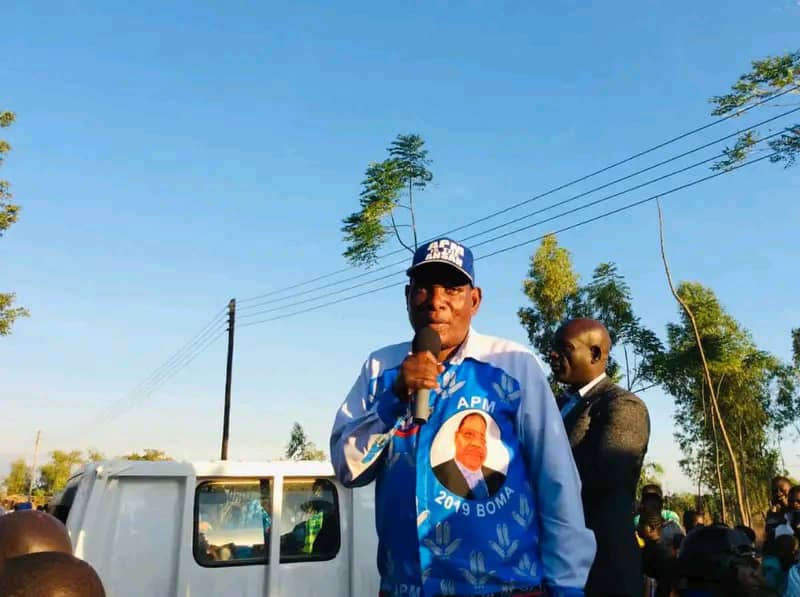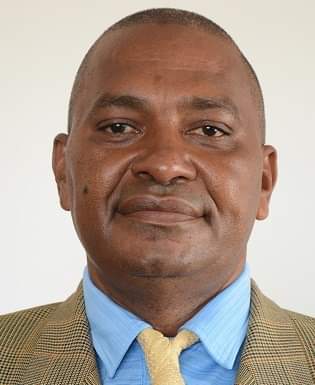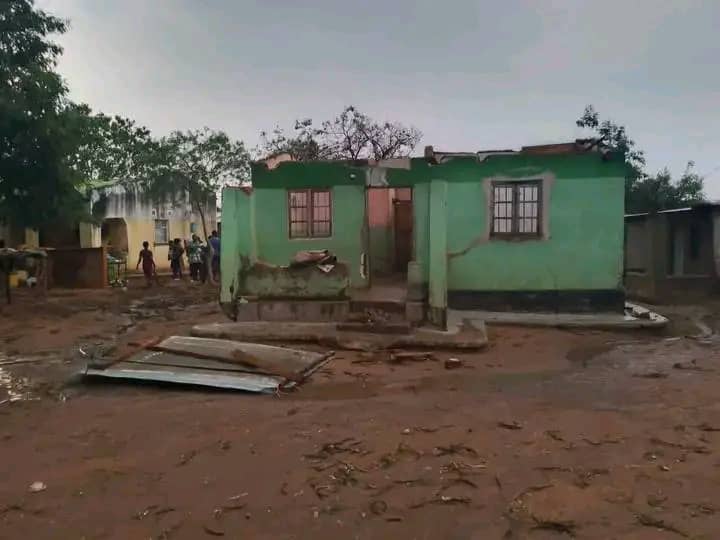By Burnett Munthali
The Democratic Progressive Party (DPP) and its Blue Alliance have taken their campaign to Chiradzulu Thumbwe Constituency through a series of whistle-stop tours.
Vice President-South and Member of Parliament, Hon. Joseph Mwanamvekha, delivered the campaign message to excited supporters at Chigodi School.
He announced that Professor Arthur Peter Mutharika is prepared to allocate five billion kwacha per constituency every year.
This funding will be directed towards small-scale but impactful development projects such as roads, bridges, school blocks, ambulances, and other essential services.
Mwanamvekha emphasized that these projects will directly improve the daily lives of Malawians, especially those in rural communities who face constant infrastructure challenges.
He also assured the people that hunger will become a thing of the past under Mutharika’s leadership.
According to him, Professor Mutharika has committed to ensuring that Malawi has enough food to meet the needs of its people.
This will be achieved by making farming inputs such as fertilizer and seeds affordable and readily available.
He further stressed that access to agricultural resources at lower prices will guarantee food security and economic stability.
Mwanamvekha made it clear that all these promises will only be realized through the people’s votes on September 16th.
He urged voters to support Professor Arthur Peter Mutharika, their parliamentary candidates, and DPP councilors to bring development to their communities.
The Blue Alliance, through Mwanamvekha, highlighted its vision of grassroots-focused development and a renewed fight against food insecurity.
The campaign in Chiradzulu Thumbwe showcased not only promises but also a strategic plan aimed at addressing Malawi’s long-standing issues of hunger and underdevelopment.
Historically, the DPP has built its political brand on infrastructural expansion and agricultural support.
During the late Bingu wa Mutharika era, the Fertilizer Subsidy Program (FISP) was widely credited with boosting maize harvests and reducing hunger in rural areas, even earning international recognition.
Similarly, under Arthur Peter Mutharika’s presidency from 2014 to 2020, the DPP prioritized road construction, rural electrification, and school block expansion as part of its development agenda.
However, critics have argued that while the party achieved notable successes, challenges such as corruption, inconsistent policy implementation, and overdependence on subsidies hindered long-term sustainability.
These mixed results form the backdrop against which Malawians will evaluate current promises of affordable fertilizer, improved food security, and constituency-based development financing.
Comparisons with the current administration are unavoidable.
Since 2020, Malawians have been grappling with daily hardships that cut across every household.
The price of basic goods such as sugar, cooking oil, and soap has more than doubled, stretching family budgets to breaking point.
Fertilizer, which once sold at a manageable price of about K18,000, now costs well over K150,000, forcing many farmers to scale down their fields or abandon planting altogether.
In the villages, stories are common of families reducing the number of meals they eat in a day, while in towns, people line up at shops only to find shelves empty of essentials.
Fuel shortages have meant long queues at filling stations, while transport costs have eaten into the little income many households depend on.
For ordinary Malawians, these challenges are not abstract economic statistics — they are lived realities felt in the kitchen, in the fields, and in the market every single day.
Against this backdrop, DPP’s promises of cheaper farm inputs, food sufficiency, and targeted development financing may resonate even more strongly with rural voters who are directly bearing the brunt of today’s economic pressures.
With five billion kwacha per constituency and a commitment to agriculture, infrastructure, and healthcare, the DPP is presenting itself once again as the party of practical solutions.
The ultimate test, however, will come on September 16th when the people cast their votes to decide if these pledges can be turned into reality.
Concluding Analysis
The Blue Alliance’s message resonates strongly with rural communities that have long been neglected in terms of infrastructure and food security.
By promising targeted development projects and affordable farming inputs, the campaign is appealing directly to the everyday struggles of Malawians.
Yet, the inclusion of historical context reveals that voters will weigh these pledges against the DPP’s previous track record in government.
The direct contrast with the current administration’s economic record—marked by shortages of essentials, unaffordable fertilizer, and rising food prices—makes the DPP’s message sharper and more urgent.
Past achievements in food security and infrastructure expansion stand as evidence that the party can deliver, but past challenges remind Malawians of the importance of accountability and transparency.
As the elections draw closer, Chiradzulu Thumbwe voters will decide whether to give the DPP another chance to implement reforms and revive the nation’s agricultural backbone.
If the people believe in this renewed vision, September 16th could mark the beginning of a significant transformation for both the constituency and the nation.




